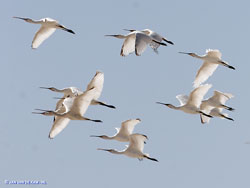Spoonbills habitually fly further than is good for them

Spoonbills that spend the winter in the south of Europe have a higher survival rate than birds that fly to their ‘traditional’ wintering grounds in West Africa. Despite this, a significant number of birds make the journey each autumn all the way to Africa. Spoonbills thereby demonstrate that habitual behaviour can be a major limitation when it comes to making the necessary adaptations to a changing climate or habitat. These are the findings presented by Groningen biologist Tamar Lok and colleagues in The American Naturalist.
Lok and her colleagues analyzed the data on more than 2000 spoonbills that were ringed as nestlings in colonies in the Netherlands from 1988 to 2010. They then looked at where these birds were spotted in winter. Between the northern-most wintering grounds in France and the southern-most area in Senegal there is a difference in flying distance of no less than 4,000 kilometres.
Survival
The study shows that birds that didn’t fly all the way to Africa had a higher survival rate. Birds that stayed in France or on the Iberian peninsula had a more than 10% greater chance of making it through to the following summer than those that flew to Africa. Based on these figures, you would expect increasing numbers of spoonbills to stay in Europe over the years. While the researchers did indeed observe a shift of this nature, it was far less than expected.
Habitual behaviour Ecological theories assume that birds only make use of lower-quality areas if their numbers grow too high in the better areas. Lok and colleagues report that while this theory is often correct on a fairly small scale, such as within a breeding area, their research shows that on the scale of an entire migration route other mechanisms are more powerful. The habitual migratory behaviour of birds ‘forces’ them to make choices that are no longer in their best interests.
Climate change
Among other things, the migratory behaviour of spoonbills provides important clues for studying the impact of rapid environmental changes. Even though some birds have learned that another wintering ground is a better place to be, large groups remain faithful to their old habits. This ‘traditional’ behaviour means that it is harder for a population to adapt to climate or habitat changes resulting, for instance, from human intervention.
For more information:
-
Tamar Lok
-
Otto Overdijk, email o.overdijk@natuurmonumenten.nl
-
Theunis Piersma, or email theunis.piersma nioz.nl
Article title: Migration Tendency Delays Distributional Response to Differential Survival Prospects along a Flyway, 21 Februar 2013 published in The American Naturalist
More news
-
15 September 2025
Successful visit to the UG by Rector of Institut Teknologi Bandung
